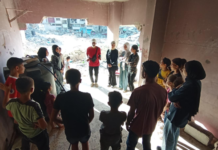Lorenzo Tondo, Quique Kierszenbaum & Malak A. Tantesh
The Guardian / July 14, 2024
Health officials say at least 90 people killed and 289 injured by strike on camp for displaced people in Khan Younis.
Israeli forces say the Hamas military chief, Mohammed Deif, the mastermind of the 7 October attack, was the target of a strike in Khan Younis, southern Gaza, which, according to the territory’s emergency services, has killed 90 people and injured hundreds more.
Deif, 58, who has been on Israel’s most-wanted list since 1995 and escaped multiple Israeli assassination attempts, is believed to be the chief architect of the attack that killed 1,200 people in southern Israel and triggered the Israel-Hamas war.
The Israel Defense Forces (IDF) said Rafa Salama, another top Hamas official, was also targeted in the strike. The IDF did not have details on whether the two were killed.
A military official later said they were “still checking and verifying the result of the strike”, and did not deny it took place inside an area the Israeli military had designated as safe for hundreds of thousands of Palestinians.
“The air force and the southern command attacked, based on accurate intelligence information, in the area where the two top targets of the Hamas terrorist organization and other terrorists were hiding among civilians,” reads a joint statement released by IDF and Shin Bet intelligence agency. “The area that was attacked is an open and wooded area, with several buildings and sheds.”
Benjamin Netanyahu, the Israeli prime minister, said: “There is still no conclusive certainty that the two have been foiled, but I want to assure you that one way or another we will reach the top of Hamas.”
Hamas’s deputy leader, Khalil al-Hayya, told Al-Jazeera TV that Deif had not been killed in the strikes and, addressing Netanyahu, said: “Deif is listening to you right now and mocking your lies.”
Gaza’s health ministry said on Saturday that Israel’s strike on a camp for displaced people in Khan Younis killed at least 90 Palestinians and injured 289 others. Residents said they witnessed at least five “big warplanes bombing in the middle of Al-Mawasi area, west of Khan Younis”.
Most of the injured were sent to Nasser hospital. However, according to officials and medics, the facility is “no longer able to function” as doctors are “overwhelmed with large numbers of casualties”.
Hamas says that Israeli claims of targeting leaders of the Palestinian militant group are “false” and are aimed at “justifying” the attack.
The Israeli military said its strike on Deif was in a “fenced Hamas area” and that most people there were militants.
Earlier, a senior Hamas official called the Israeli allegations “nonsense”. “All the martyrs are civilians and what happened was a grave escalation of the war of genocide, backed by the American support and world silence,” Sami Abu Zuhri told Reuters, adding that the strike showed Israel was not interested in reaching a ceasefire deal. He did not confirm whether Deif had been present.
The targeted area of Nus Street contains more than 80,000 displaced people from across Gaza.
Witnesses said ambulances and civil defence crews were targeted after the strike, with a number of hovering Israeli aircraft “shooting and targeting directly at the ambulances and rescue teams upon their arrival”.
The Gaza health ministry said: “The number of the victims is still increasing because bodies are still being recovered beneath the rubble”.
“Rescue teams are still recovering dozens of martyrs and wounded until this moment from the site of bombing and targeting,” reads a statement by the government information office in Gaza. “This massacre comes in conjunction with the lack of hospitals that can receive this large number of martyrs and wounded, and in conjunction with the occupation’s destruction of the health system in the Gaza Strip.”
Not seen in public for years, Deif, known as “guest”, has frequently changed locations to elude Israeli detection. Engaged with Hamas from a young age, the former science student orchestrated a series of suicide bombings targeting Israeli civilians in the 1990s and then again a decade later.
Speculations suggest that Deif may have been disabled in one of the numerous Israeli attempts on his life, with his spouse and young children having died in a 2014 airstrike.
Referred to by Israeli authorities as “a dead man walking”, Deif’s actual name is Mohammed Diab Ibrahim al-Masri.
On 7 October, Hamas issued a rare voice recording of Deif announcing the “Al-Aqsa Flood” operation.
The Saudi channel Al-Hadath reported that Salama, the commander of Hamas’s Khan Younis Brigade, was killed in the strike and that Deif was seriously wounded.
The death of Deif could represent a significant victory for Israel and a devastating blow to Hamas. The operation could provide Netanyahu with a potential advantage, as he has made clear his intention to continue the war until Hamas’s military capabilities are destroyed, with Deif’s death being a significant step in that direction.
Saturday’s strikes came as US, Egyptian and Qatari mediators were actively working to narrow the divide between Israel and Hamas in a proposed three-phase ceasefire and hostage release plan.
The talks were halted after three days of intense negotiations failed to produce a viable outcome, two Egyptian security sources said on Saturday, blaming Israel for lacking a genuine intent to reach agreement.
The sources, who spoke to Reuters on condition of anonymity, said the behaviour of the Israeli mediators revealed “internal discord”.
According to the sources, the Israeli delegation would give approvals on several conditions under discussion, but then come back with amendments or introduce new conditions that risked sinking the negotiations.
The sources said the mediators viewed the “contradictions, delays in responses, and the introduction of new terms contrary to what was previously agreed” as signs the Israeli side viewed the talks as a formality aimed at influencing public opinion.
Hamas leader Ismail Haniyeh on Saturday accused Netanyahu of seeking to block a ceasefire in the Gaza war with “heinous massacres”.
He said Hamas had shown “a positive and responsible response” to new proposals for a ceasefire and prisoner exchange, but “the Israeli position taken by Netanyahu was to place obstacles that prevent reaching an agreement,” Haniyeh said in a statement.
Lorenzo Tondo is a Guardian correspondent covering Italy and the migration crisis
Quique Kierszenbaum is a Jerusalem based reporter and photographer
Malak A Tantesh is a reporter based in Gaza












